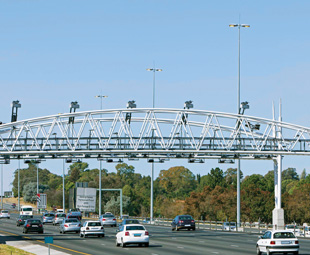My Christmas wish list

As we all wind down for the year-end break, we must remain ever “razor-sharp” as 2015 rolls around
My reference last month to 2015 and the e-toll report was perhaps a bit premature, but the report hasn’t emerged as yet. That’s just as well, though, as a few developments have taken place that should give us more food for thought over the Christmas period …
The Business Day of November 7, carries three articles that have a bearing on the impending e-toll report. On the front page, we read that Moody’s has downgraded South Africa’s credit rating one notch. On page two, we read that the e-toll review panel heard more evidence on the economic benefits of road upgrades. Further inside, on the editorial page, the political correspondent of Business Day, Natasha Marrian, describes the e-toll panellists as “razor-sharp”.
Well, let’s see how sharp they are. Heaven knows, we need people who can cut through the morass of guesswork, thumb-sucking and sheer incompetence that permeates the transport industry, particularly on the passenger side.
A significant development is that the South African National Roads Agency Limited (Sanral) is still punting the sponsored 2008 report produced on its behalf by the University of Cape Town. To refresh readers’ memories, the report calculates that for each R1 spent on tolling, motorists would get R8,40 back.
A previous Hopping Off column suggested that this report had been quietly shelved, but no – it has been re-submitted to the panel. I look forward to seeing what the panellists have to say about this figure. If it is remotely near the truth, as a panellist I would want to know why we don’t have toll roads everywhere, and why we have taken so long to introduce them. South Africa desperately needs this kind of boost to its flagging economy!
In the Western Cape, where wages and the value of time are, presumably, lower than in Gauteng, perhaps the benefits will only amount to R6,40, but still well worth going for. Perhaps KwaZulu-Natal (KZN) will only show benefits of R5,40 – sorry KZN – no disrespect intended! On receiving news such as this, perhaps Moody’s will upgrade us!
Seriously, though, we can only express the hope that the panel’s report will include at least the following (in no particular order):
1. Question the role of the academic world in all of this. What do the engineers, sociologists, accountants and economists have to say? Previous Hopping Off columns have referred to the dismal performance of bodies like the National Research Foundation. Has it submitted independent research to the panel? Or does only “sponsored research” count?
2. Question why car usage is rocketing in South Africa, while all other indicators are stagnant.
3. Link this with the shocking state of public transport in South Africa. This is why more cars are being bought, congestion is increasing and more road space is needed.
4. Suggest that the current drop in the fuel price be used to cushion later increases in energy costs. Use the money to start a ring-fenced fund; not for road maintenance, but to start to even out the horrendous discrepancies in fares and service levels on public transport.
5. “Who should administer the fund?” I hear you ask, and I share your cynicism. Preferably not only the Treasury, which has shown itself to be on Sanral’s side in all of this. At least one of its employees sits on Sanral’s board, and the Treasury has made no meaningful suggestions to fix the country’s disorganised state of public transport funding. Why do taxi passengers get six cents while Gautrain passengers get R77?
6. Look at the composition of the Sanral board and inlcude some taxi passengers. Don’t laugh – could they do worse?
7. Tell the faith-based organisations to broaden their vision on transport issues. It isn’t enough to support the Opposition to Urban Tolling Alliance (Outa), which represents car users, who should have enough economic clout to look after themselves.
Churches should be doing more for really poor and unemployed people, who get no benefit from the unconvincing excuse that public transport is “exempt” from e-tolls. The poor need to benefit from really low fares on public transport. Churches should insist that the massive distortions between rail and taxi subsidies be addressed, and draw attention to the fact that the poor would benefit from consistent fares, irrespective of the mode of travel.
Well, that’s my Christmas wish list. Are there any “razor-sharp” people out there who agree?
Vaughan Mostert is a senior lecturer in the Department of Transport and Supply Chain Management at the University of Johannesburg. He developed a love for public transport early in life, which led to a lifelong academic interest in the subject. Through Hopping Off, Mostert leaves readers with some parting food for thought as he continues his push for change in the local public transport industry.
Published by
Focus on Transport
focusmagsa




